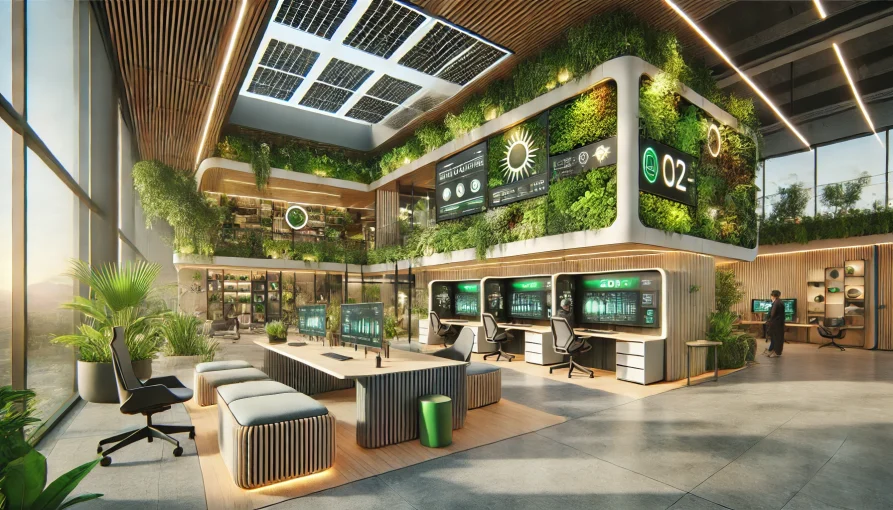

Creating an eco-friendly workspace is more than just a trend; it’s a necessary step toward environmental responsibility. Sustainable office workstations are a pivotal part of this movement, allowing you to minimise your ecological impact while fostering a healthier and more productive work environment. Here’s how to design a sustainable office workstation that aligns with eco-conscious practices.
Selecting office furniture made from sustainable materials is the first step to building an eco-friendly workspace. Look for furniture crafted from recycled or responsibly sourced wood, bamboo, or metal. These materials are not only durable but also have a lower environmental impact compared to traditional alternatives. Office furniture with certifications such as FSC (Forest Stewardship Council) ensures that it has been produced with minimal harm to the environment.
Proper lighting is essential for any workstation, but choosing energy-efficient options helps reduce carbon emissions. LED desk lamps and overhead lights consume significantly less energy than incandescent bulbs and last much longer. Consider adjustable desk lamps with dimmable features to optimise the amount of light based on your work needs. This choice not only saves energy but also reduces your electricity bill over time.
Incorporating recycled materials into your office setup can make a meaningful difference. For example, desks and shelves made from recycled wood or plastic contribute to a circular economy and decrease waste. Reusable items such as glass water bottles, stainless steel pens, and fabric organisers further reduce your consumption of single-use plastics. Embracing these sustainable alternatives helps lower your carbon footprint and promotes responsible consumption.
Introducing natural elements into your workspace enhances both the aesthetics and environmental quality of your office. Indoor plants not only add a touch of greenery but also improve air quality by absorbing carbon dioxide and releasing oxygen. Choose plants that require minimal maintenance, such as snake plants or pothos, to reduce the need for excessive watering and care. These green additions help create a calming atmosphere, which can enhance productivity and mental well-being.
The sustainable design of office furniture goes hand-in-hand with ergonomic comfort. An ergonomic chair or desk made from sustainable materials can support a healthy posture and reduce strain during long working hours. Adjustable desks, whether sit-stand or fixed height, made from eco-friendly materials, offer versatility that supports your physical health while reducing waste. Ensure that any additional office furniture or accessories chosen are designed with both sustainability and human comfort in mind.
For the tech-savvy professional, solar-powered equipment is an excellent way to harness renewable energy. Solar-powered calculators, chargers, and even small fans can help reduce your reliance on mains electricity. This is particularly beneficial for offices with plenty of natural light, as these items can charge during the day, providing you with energy independence and a reduced carbon footprint.
Implementing a recycling system within your workspace is crucial for sustainability. Designate separate bins for paper, plastics, and other recyclables to encourage proper disposal. Upcycling office supplies such as jars and containers can be used to organise and store stationery items, offering a practical and eco-friendly alternative to single-use organisers. This practice helps reduce waste while promoting a more sustainable way of living.
To minimise the amount of office furniture needed, opt for multi-functional pieces. Desks that double as storage units or chairs that convert into lounge seats can reduce the demand for additional items. Multi-functional furniture helps make the most of the available space while reducing the amount of material used in your office design. This approach is particularly useful for home office workstations or compact office spaces.
One of the most impactful changes for creating an eco-friendly workstation is reducing paper use. Opt for digital documentation and online file storage solutions to cut down on physical paper usage. Use digital note-taking apps or e-signature tools to maintain productivity without the need for printed documents. This transition not only conserves paper but also reduces clutter and makes finding information more efficient.
Sustainability doesn’t stop at the initial purchase; it involves maintaining and extending the life of office furniture. Regularly cleaning and servicing your furniture ensures its longevity, reducing the need for replacements. If items become damaged or no longer meet your needs, consider upcycling or donating them instead of discarding them. By doing so, you contribute to a reduction in waste and support a circular economy that benefits the planet.
Designing an eco-friendly office workstation involves more than choosing the right materials; it requires adopting a mindset that prioritises sustainability. The choices you make with your office furniture, lighting, and supplies can significantly reduce your environmental impact. Embracing sustainable practices not only supports the planet but also fosters a workspace that is healthier and more conducive to productivity. By making thoughtful choices, you can create an eco-friendly workstation that aligns with modern environmental values.
Discover five warning signs that indicate it’s time to replace your car. From repair costs…
Having PPE on hand isn’t enough to protect your team. Learn how to enhance safety…
When it comes to maintaining or upgrading a home, roofing is often one of the…
When it comes to maintaining the integrity and value of your property, a sturdy roof…
When it comes to maintaining and enhancing the integrity of any structure, the quality of…
Rhode Island, renowned for its scenic coastlines and historic architecture, presents unique challenges and opportunities…